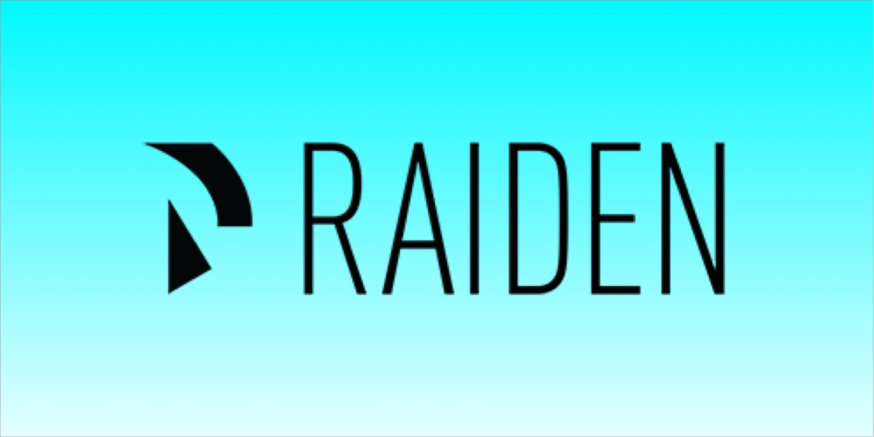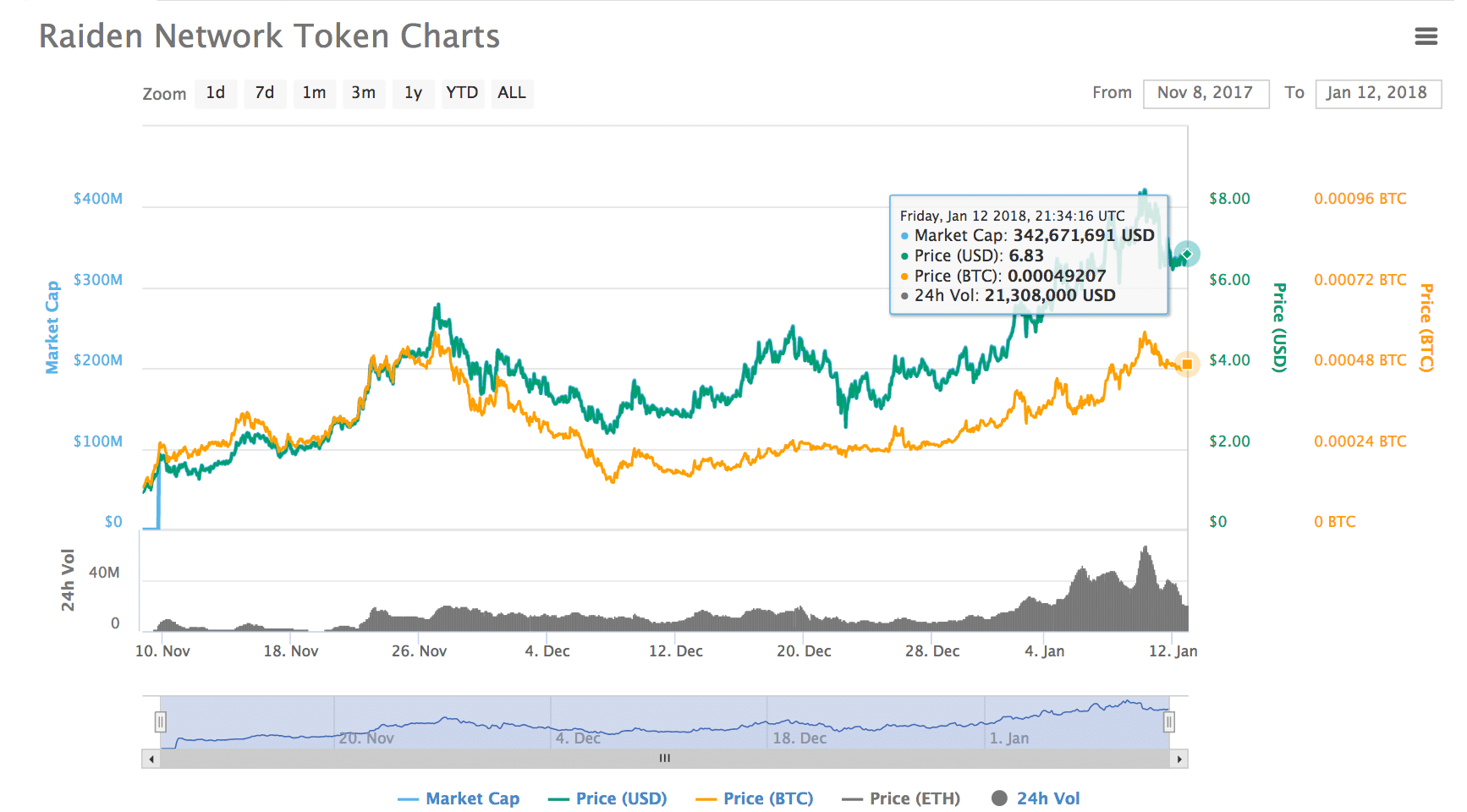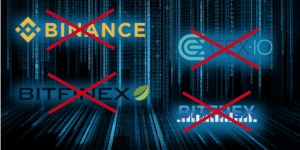- Key features of RDN
- How Does RDN Work?
- About RDN
- RDN Coin Supply
- RDN Trading History
- Where Can You Buy RDN?
- Where Can You Store RDN?
- Conclusion
What is Raiden Network Token (RDN)?
The Raiden Network Token is the native currency of the Raiden Network, which describes its protocol as a means for “fast, cheap, scalable token transfers for Ethereum”. The protocol is meant to complement Ethereum, not compete against it, allowing for Ethereum compatible tokens (ERC-20) to be utilized.
In general, the Raiden team describes the main problem with blockchain being scalability. Enormous fees coupled with long confirmation times make the idea of mass adoption of Ethereum (along with other blockchains such as Bitcoin) unrealistic at the moment. That’s where the Raiden Network comes in. Using off-chain transactions to solve the scalability problems facing Ethereum, Raiden will deliver “near-instant, low-fee” payments regardless of the number of transactions being processed in the network.
Key features of RDN
The Raiden Network is essentially Ethereum’s solution to scalability issues and is Ethereum’s version of Bitcoin Lightning. With that being said, understanding the purpose of Bitcoin Lightning will ease your understanding of RDN.
According to a video published on the Raiden Network’s official website, before the wide-scale adoption of blockchain payments occur, it must be able to facilitate roughly 100,000,000 tps. As of now, the Ethereum blockchain is capable of handling around 10-15 tps (transactions per second). Compared to the Visa credit card, which can handle 45,000 tps, the current Ethereum network is highly inefficient.
The key features that encompass the Raiden Network to expedite transactions with low fees are as follows:
- Expedited transfer confirmations (<1 second ). Current transfers on the Ethereum blockchain can take a few seconds to minutes.
- Private transfers that are not viewable on the global ledger.
- Solve scalability issues so that Ethereum can create mass adoption, allowing Ethereum to become the peer-to-peer, global payments infrastructure with electronic cash that it was initially designed for.
- Low fee transactions
- Micropayment capability
- Works in union with any ERC-20 token. Tokens on this list include EOS (EOS), Tron (TRX), Icon (ICX), Binance Coin (BNB), and more.
How Does RDN Work?
According to its hiring page on angel.co, RDN will work by switching “from a model where all transactions hit the shared ledger on the blockchain to a model where users can transfer tokens by privately exchanging messages without involving a global consensus protocol while maintaining security and guarantees as expected from the blockchain system.”
Raiden Network’s technology can be expressed as a layer on top of the blockchain, ultimately creating a cooperative union between it and Ethereum’s basic framework. It removes the need for global consensus, which significantly reduces the networks capability to scale at improved levels. Removing the need for a global consensus is “done by leveraging a network of payment channels which allow to securely transfer value off-chain, i.e without involving the blockchain for every transfer.”
Broken down in simplest terms, the protocol goes something like this:
- Payment channels which allow for safe,off-chain transactions. With cryptographic proof and smart contracts, the transaction can be completed effectively and securely as it is always upheld by an on-chain “down-payment”.
- Bidirectional payment channels, allowing for back and forth token transactions.
- Multihop, hash-locked transfers, enabling the tokens to pass through numerous nodes instead of a single node while being secured with a “key”. Without the secret key provided by the original sender, the tokens cannot be claimed on-chain.
About RDN
The Raiden Network project is being developed by Germany’s Brainbot Technologies AG, a software company devoted to blockchain protocol development. Founded in the year 2000 by Heiko Hees, it currently has between 11 to 50 employees in offices among Berlin, Mainz, and Copenhagen. Also the founder of PediaPress, Hees has been a core developer of Ethereum since March 2014. Being a core developer for Ethereum, it is evident on how the founder sees the flaws in the current its present protocol with ways to improve it.
Interestingly enough, the website does not include RDN as one of their main blockchain developments, which could be attributed to the difficulty of highlighting a wide variety of projects they are currently undertaking on one page. However, there are no updates on the status of the Raiden Network Project on either Twitter nor Medium since December 1st, 2017. While various sources suggest the project is delayed, it does seem that the project is underway with a further look into their current open positions (which can be applied for here) and recent updates to their Github.
RDN Coin Supply
The total supply of RDN rests at 100,000,000 and has a circulating supply of nearly 50% of that at 50,148,936. With a market cap of nearly $341 million, it is currently in the #102 position among all coins.
On December 1st, the team announced via Twitter “we are moving some RDN to the liquid supply to a) compensate advisors b) have some tokens in a more handy wallet.” According to Raiden’s official website, the coins were allocated in the following manner:
- 50% Public auction
- 34% Retained by brainbot labs Establishment (Raiden project lead)
- 16% External development fund
Thus, it is noted that a large amount of RDN coins are being used to fund the project’s development.
RDN Trading History
Compared to other cryptocurrencies, the coin has had a somewhat steady increase in the past few years, which could possibly reflect the investor communities sentiments that this is a long-term hold rather than a quick money maker.
Where Can You Buy RDN?
You can purchase RDN on exchange sites such as Huobi, Binance, and Gate.io. One of the simplest ways to trade for these coins is to initially create a Coinbase or Bitstamp account. Once verified, you can purchase Ethereum via bank transfer or credit card and then deposit the tokens onto an alternative exchange, such as Binance. As soon as you receive the tokens, follow the steps on the respective exchange being utilized and trade away.
As of now, it is a bit difficult to register on many exchanges due to the overwhelming interest in cryptocurrency. This makes it difficult for exchanges to keep up with demand and are often turning away new users from an inability to provide adequate services without updating their infrastructure. If you are attempting to invest in cryptocurrency, please keep in mind doing your due diligence to find reputable sites that won’t steal your personal information. If you take a look at our comprehensive guide “How to Buy Bitcoin and Other Popular Cryptocurrencies”, you’ll find an array of exchange sites to help you get started on your RDN quest.
Where Can You Store RDN?
Given that RDN is an ERC-20 token, you can store it on hardware wallets that support the Ethereum blockchain such as Trezor or Ledger Nano S. You can also store it on MyEtherWallet (MEW). To check out more wallets, refer to our guide The Best Ethereum Wallets.
Conclusion
Since its inception in 2015, the Raiden Network defines itself as “a highly anticipated blockchain core infrastructure project, with the goal to scale the Ethereum platform capacity to support significant adoption.” It is interesting to note the lack of updates that could potentially lure investors, however, the project in itself seems like a long-term hold rather than just another pump-and-dump scheme.
The use-case for the project and background of the CEO are interesting facets of the project that gives merit to its credibility. If everything works out, we could see RDN as one of the main go-to digital currencies for retail and P2P payments.
Without further information on the project and due to the general nature of the cryptocurrency industry, the project is still highly speculative. Please remember, this is merely an informative article that is not to be considered financial advice.
Never Miss Another Opportunity! Get hand selected news & info from our Crypto Experts so you can make educated, informed decisions that directly affect your crypto profits. Subscribe to CoinCentral free newsletter now.












